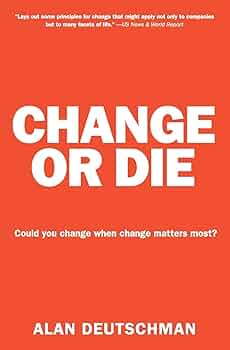Talk about a book title that grabs your attention! Quite a few colleagues have recommended this book to me, in part because they know that meaningful change is difficult to achieve for so many people. The basis for the title “Change or Die” is that numerous studies have found that upwards of 9 out of 10 people don’t change their lifestyles and behaviors…even when their lives depend upon it.
Subtitled The Three Keys to Change at Work and in Life, the book asks the question, “Could you change when change matters most?” A multitude of behavior-related issues continue to drive the large majority of healthcare costs in the United States, including smoking, drinking and eating too much, high levels of stress, and not enough exercise. If potentially only one out of every ten people can change our behaviors in a meaningful way, even when it’s imperative to do so, then what hope do any of us really have?
Deutschman suggests that there is a way to effect meaningful, sustainable change but most people (groups, organizations, companies, etc.) miss the mark. People and organizations change all the time, however the author doesn’t focus on how people change on their own. His main topic is “how to change when change isn’t coming naturally; when the difficulties stubbornly persist. When you’re stuck.”
The First Key to Change
RELATE: You form a new, emotional relationship with a person or community that inspires and sustains hope. The leader or community has to sell you on yourself and make you believe you have the ability to change. They have to sell you on themselves as your partners, mentors, role models, or sources of new knowledge. And they have to sell you on the specific methods or strategies that they employ.
The Second Key to Change
REPEAT: The new relationship helps you learn, practice, and master the new habits and skills that you’ll need. It takes a lot of repetition over time before new patterns of behavior become more natural, and even automatically or subconsciously (you act the new way without even thinking about it).
The Third Key to Change
REFRAME: The new relationship helps you learn new ways of thinking about your situation and your life. Ultimately, you look at the world in a way that would have been so foreign to you that it wouldn’t have made any sense before you changed.
These are the three keys to change: relate, repeat, and reframe. New hope, new skills, and new thinking.
Why is it that we spend billions of dollars every year to change and improve, yet so often people still fail to realize their goals? Deutschman contends that “the reason isn’t that they don’t want to change or can’t change but rather that they don’t understand change or have the right tools to effect it.”
People often make two of the most common mistakes when they try to motivate others to change their behavior: they rely on fear or facts (or both). Fear may work; but often only for a brief time. And people are frequently in denial and can’t handle the facts, even when they confront the facts and clearly understand them. Challenges abound in getting people to, first, understand that they need to change and then to appreciate how to change (what they need to do). And, finally, to actually do it. No wonder most New Year’s resolutions fall by the wayside so quickly.
Enablers of Change
Deutschman discusses some important enablers of change, such as:
- Our beliefs, formed through repeated experience over time, can usually be reshaped only by experience. Change needs to be experienced and short term wins achieved in order to gain the momentum required to drive more significant and lasting change.
- A great commitment to change. Meaningful change does not come easily. Be prepared to work hard at accomplishing your goals.
- The power of community and culture. Don’t go it alone. Invite others into your plans and activities. Leverage their power, knowledge, support and experiences. Involve yourself with those you trust and who can help you achieve change; not those who will hinder you.
Change can occur even when you’re stuck. But you must be purposeful in your approach, your attitude, and your activities. Otherwise, you might end up as one of the nine in ten who don’t change, even when it is imperative that you do. All the best on your journey!
Relatedly, check out Immunity to Change by Robert Kegan and Lisa Laskow Lahey.

